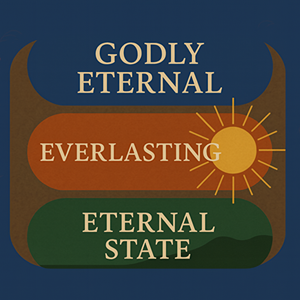
| Framework | Description | Representative Verses | Duration |
|---|---|---|---|
| Godly Eternal | The self-existent, timeless being of God. He alone is uncreated, without beginning or end. | Psalm 90:2; Revelation 1:8 | No beginning, no end |
| Everlasting (Temporal) | The created order - heavens, earth, and time itself. It had a beginning and will have an end. | Genesis 1:1; 2 Peter 3:10–13 | Beginning and end |
| Eternal State | The new heaven and new earth that begin after judgment - creation renewed and unending. | Revelation 21:1; Isaiah 65:17; Luke 20:36 | Beginning, no end |
| Passage | Language | Word | Meaning | Duration | Outcome |
|---|---|---|---|---|---|
| Matthew 25:46 | Greek | Aiōnios | Eternal, timelessly enduring | Unending | Life or punishment |
| Daniel 12:2 | Hebrew | 'Olam | Hidden, perpetual duration | Unending | Life or contempt |
| Aspect | Before Creation | In Eternal Separation |
|---|---|---|
| Relation to God | Within His will and foreknowledge | Outside His fellowship and grace |
| Consciousness | Unconscious | potential Conscious isolation |
| Purpose | Awaiting life | Existing apart from life |
| Orientation | Toward creation and communion | Away from God and meaning |
| Emotional quality | Anticipated joy (Job 38:7) | Eternal loss and regret |
| Stage | Description | Relationship to God |
|---|---|---|
| 1. Foreknown in Eternity | Existed in God's perfect knowledge before creation. | Known but not yet conscious. |
| 2. Temporal Life | Conscious, moral existence within the present everlasting world. | Granted opportunity to know God. |
| 3. Judgment | Separation of the righteous and unrighteous at the close of the age. | Divine justice applied perfectly. |
| 4. Eternal State | Final, unending existence - either in God's presence or apart from Him. | Everlasting communion or everlasting isolation. |